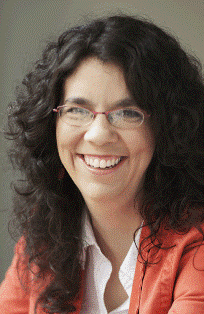 Where did the idea for Seraphina come from?
Where did the idea for Seraphina come from?
The first idea I had, back when I first started writing, was about the grief that Seraphina's father has. I used to draw comic books, and I had this world in which dragons could take human form. When I started to do the book, my parents had just split up after 35 years. I didn't know my mother was unhappy. I thought, What if you married a dragon in human form, and you didn't know, and you only found out when they died--and died in childbirth, in this case. You have this conflict, and a dead partner you can't confront and say, "Why did you lie to me all these years?" What kind of dilemma would that be for a person? Seraphina has these maternal memories, which help. But her feelings about her mother are complicated, too. Not least of which are the lies her mother told her father and how that affected Seraphina's growing up.
Tell us about those "maternal memories," or mind-pearls.
I have an amateur fascination with neurology. I love reading books about how the brain works. It's spongy and fallible and sure of itself when it shouldn't be. When the brain gets injured, different parts of the brain can be repurposed to make up for the part that was injured. It's not a perfect system, but different parts can be used in their place.
So the idea is that the mother, because dragon brains are different than ours, can put a copy of the memory in a different place, like a second copy. You can't access it unless you know the way to access it. So she encapsulates these, but does it in such a way that something would trigger the memory. It relates to the idea of guided meditation. You feel like there's stuff in there you can't access, and there are different ways to tap into it.
Was the character of Orma there from the beginning?
Orma showed up very early. He has evolved over time, too. He used to be much more of an antagonist. He felt some betrayal that Claude [Seraphina's father] had lured his sister away. I'm glad that fizzled and he turned into more of a relatable character. People have warmed to him, the way that one warms to Vulcans and others like them, these unemotional characters who are a little bit baffled in the human sphere.
A recurring theme in the book is the juxtaposition of truth and art.
Those are two preoccupations of mine. When my son was five, he used to pretend that he had a lab. His dad is a physicist, and my son had a lab full of equipment--all in his mind, of course. His dad, who's a literal-minded fellow, was bothered by this. Did Byron understand the difference between truth and lying? He'd tell Byron, "Don't say that, you don't have a lab." Byron was extremely upset. The compromise we came to is that Byron would refer to it as "Mystery Lab." He knew he was making things up, but we respected what happened there. That is the place where art and lying and truth intersect. There's literal truth, and there's emotional truth, and they're both important.
Does that relate to what Seraphina's mother says: "Emotions fly humans toward art"?
I think Seraphina's mother found that component fascinating. I think some dragons are taught to pack away emotions but think, "Why should I if I see benefits to this that my teachers and government aren't seeing?" I think art and emotion go hand in hand. You have these big emotions and where do you put them? You can peel off your scales, that's one way, but maybe not the most constructive. Big emotions are something many of us struggle with.
Let's talk about that scene where Seraphina is in so much emotional pain that she cuts off a scale. She talks about feeling "the freeze" and experiencing a "relief." It's not unlike the act of cutting, or drinking or using drugs in the human world.
That freeze doesn't solve the problem, but you can delude yourself into thinking it does. You've distracted yourself from what the problem is temporarily, but ultimately it hurts you. Sometimes when you're that hurting already, you don't feel the other hurting. They hurt one at a time.
Do you foresee more books set in this detailed world you've created?
I think two will be enough for Seraphina's story, but I aspire to do more books set in this world, like Discworld. Terry Pratchett is one of my favorite writers. I consider him a big influence. I feel like he and I are both preoccupied with the same things. You can really see him behind the books he writes. You have an idea of what that mind is like. That's what I read for. Some people read for plots or characters, but I read for the person behind the words.

